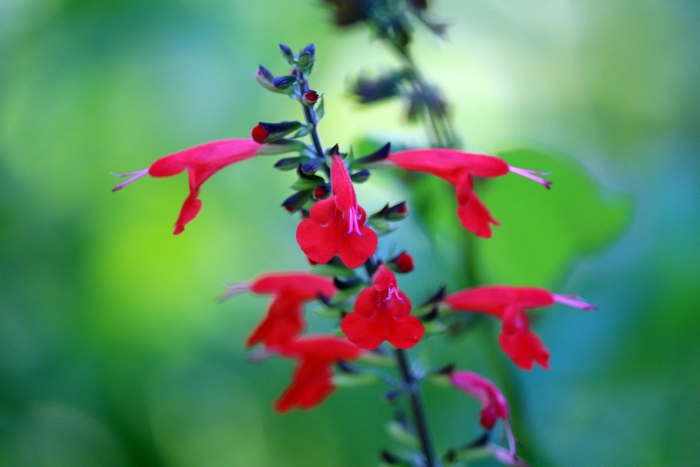Scarlet Sage
(Salvia coccinea)
Scarlet Sage (Salvia coccinea)
/
/

Lauren McLaurin
CC BY 4.0
Image By:
Lauren McLaurin
Recorded By:
Copyright:
CC BY 4.0
Copyright Notice:
Photo by: Lauren McLaurin | License Type: CC BY 4.0 | License URL: http://creativecommons.org/licenses/by/4.0/ | Rights Holder: Lauren McLaurin | Publisher: iNaturalist | Date Created: 2018-09-15T11:26:06-07:00 |



















































Estimated Native Range
Summary
Salvia coccinea, commonly known as Scarlet Sage, is an herbaceous plant that can behave as an annual or short-lived perennial, depending on the climate. It is native to a wide range of habitats including pine flatwoods, coastal uplands, and disturbed areas in the southeastern United States, Mexico, Central America, South America, and the Caribbean. It typically reaches 2 to 4 feet (0.61 to 1.22 meters) in height with a spread of about 2.5 feet (0.76 meters). Scarlet Sage has a bushy habit with square stems and vibrant, tubular flowers that are highly attractive to hummingbirds and butterflies. Flower color is variable, with the naturalized variety displaying bright red blooms about 1.25 inches (3.2 cm) long. The flowering season extends from early summer to late autumn, providing a long-lasting display of color.
Scarlet Sage is valued for its ease of maintenance and the bright, showy flowers that enliven garden spaces. It is commonly used in urban green areas, private gardens, and as a border plant. It thrives in full sun to part shade and prefers medium water and well-drained soils. It is hardy to USDA Hardiness Zones 8–10. Cultivated varieties offer a range of colors including orange-red, pink, salmon, red, white, and scarlet, as well as bi-colored options. While generally pest-free, it can occasionally suffer from fungal diseases in humid conditions. Scarlet Sage is not typically invasive but can self-seed in favorable conditions.CC BY-SA 4.0
Scarlet Sage is valued for its ease of maintenance and the bright, showy flowers that enliven garden spaces. It is commonly used in urban green areas, private gardens, and as a border plant. It thrives in full sun to part shade and prefers medium water and well-drained soils. It is hardy to USDA Hardiness Zones 8–10. Cultivated varieties offer a range of colors including orange-red, pink, salmon, red, white, and scarlet, as well as bi-colored options. While generally pest-free, it can occasionally suffer from fungal diseases in humid conditions. Scarlet Sage is not typically invasive but can self-seed in favorable conditions.CC BY-SA 4.0
Plant Description
- Plant Type: Subshrub, Herb
- Height: 1-2 feet
- Width: 1-2 feet
- Growth Rate: Moderate
- Flower Color: Red, Pink
- Flowering Season: Summer, Fall
- Leaf Retention: Deciduous
Growth Requirements
- Sun: Full Sun, Part Shade
- Water: Medium
- Drainage: Medium
Common Uses
Bee Garden, Bird Garden, Border Plant, Butterfly Garden, Deer Resistant, Drought Tolerant, Fragrant, Groundcover, Hummingbird Garden, Low Maintenance, Potted Plant, Rabbit Resistant, Rock Garden, Salt Tolerant, Showy Flowers, Street Planting
Natural Habitat
Native to pine flatwoods, coastal uplands, and disturbed areas
Other Names
Common Names: Blood Sage, Texas Sage, Tropical Sage, Sauge Écarlate, Beni-Bana-Sarubia, Zhu Chun
Scientific Names: , Salvia coccinea, Salvia superba, Salvia pseudococcinea, Salvia coccinea var. pseudococcinea, Salvia rosea, Salvia ciliata, Salvia coccinea var. minima, Salvia galeottii, Salvia coccinea f. pseudococcinea
GBIF Accepted Name: Salvia coccinea Buc’hoz ex Etl.